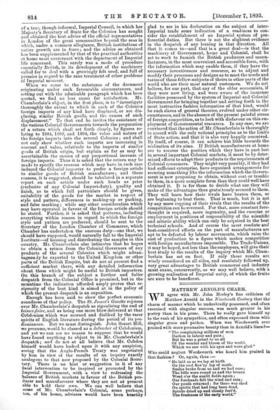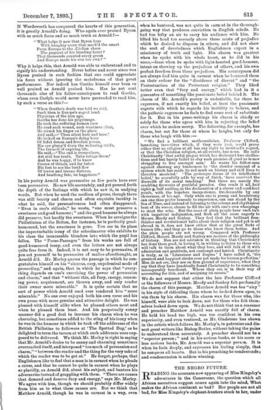MA.TTHEW ARNOLD'S CHARM.
WE agree with Mr. John Morley's fine criticism of Matthew Arnold in the Nineteenth Century that the charm of manner which he undoubtedly possessed, and often exercised with singular success, was much greater in his poetry than in his prose. There he really gave himself up to the rush of his sympathies, and often expressed them with singular grace and pathos. When was Wordsworth ever praised with more persuasive beauty than in Arnold's lines ?— " The complaining millions of men
Darken in labour and pain ; But he was a priest to us all Of the wonder and bloom of the world, Which we saw with his eyes and were glad."
Who could neglect Wordsworth who heard him praised in
that fashion ? Or, again, thus :—
"He laid us as we lay at birth
On the cool flow'ry lap of earth. Smiles broke from us and we had ease ; The hills were round us and the breeze Went o'er the sunlit fields again ; Our foreheads felt the wind and rain; Oar youth returned : for there was shed On spirits that had long been dead, Spirits dried up and closely furrd, The freshness Of the early world." If Wordsworth has conquered the hearts of this generation, it is greatly Arnold's doing. Who again ever praised Byron with so much force and so much truth as Arnold ?—
" What helps it now that Byron bore
With haughty scorn that moek'd the smart Prom Europe to the 2Etelian shore The pageant of his bleeding heart ? That thousands counted every groan And Europe made his woe her own ? "
Why it helps this, that Arnold was able to understand and to signify his understanding. Never before and never since was Byron praised in such fashion that one could appreciate his force without ignoring the melodrama of that great performance. Nor indeed has Goethe himself ever been co well praised as Arnold praised him. Has he not sent thousands also of his fellow-countrymen to read Goethe, whom even Carlyle would never have persuaded to read him, by such a verse as this ?—
" When Goethe's death was told we said,
Sunk then is Europe's sagest head.
Physician of the iron age, Goethe has done his pilgrimage.
He took the suffering human race He read each wound, each weakness clear, He struck his finger on the place And said,—' Thou sliest here and here.'
He looked on Europe's dying hour Of fitful dream and feverish pDwer, His eye plung'd down the weltering strife, The turmoil of expiring life.
He said,—' The end is everywhere, Art still has truth. Take refuge there.'
And he was happy, if to know Causes of things, and far below His feet to see the lurid flow Of terror and insane distress, And headlong fate, be happiness."
In his poetry Arnold was persuasive as few poets have ever been persuasive. He saw life accurately, and yet poured forth the depth of the feelings with which he saw it, in undying words. But when he used the medium of prose, though there was still beauty and charm and often exquisite lucidity in what he said, the persuasiveness had often disappeared. "Even in one's ridicule," he wrote, "one must preserve a sweetness and good humour ; " and the good humour he always did preserve, but hardly the sweetness. When he arraigns the Philistinism of the Briton, for instance, be is perfectly good- humoured, but the sweetness is gone. You see in its place the imperturbable irony of the schoolmaster who exhibits to his class the inexcusable blunders into which the pupil has fallen. The "Prose-Passages" from his works are full of
good-humoured irony, and even the letters are not always quite free from it. Indeed, it is not easy to be persuasive, if you set yourself to be persuasive of malice aforethought, as Arnold did. Mr. Morley quotes the passage in which he con- gratulates himself on his "sinuous, easy, unpolemical mode of
proceeding," and again, that in which he says that "every- thing depends on one's exercising the power of persuasion and charm," and that "without this, all fury, energy, reason- ing power, acquirement, are thrown away, and only render their owner more miserable." It is quite certain that no sort of power which Arnold used ever rendered him "more miserable." No one ever enjoyed both his own verse and his own prose with more genuine and attractive delight. He was pleased with himself alike when he pleased others most and when he pleased them least. And his perpetually sunny manner did a good deal to increase his charm when he was charming, but sometimes added to the sting of his irony when he was in the humour in which he took off the addresses of the British Philistine to followers at The Spotted Dog,' as he delighted to term the tavern at which such addresses were sup- posed to be delivered. We think Mr. Morley is right in saying that Mr. Arnold's desire to be sunny and charming sometimes overreached itself, and interposed" too much of persuasion and charm," "between the reader and the thing for the very sake of which the reader was to be got at." He forgot, perhaps, that Englishmen like to feel that a man is in earnest when he pleads a cause, and that he cannot be quite in earnest when he plays so placidly, as Arnold did, about his subject, and banters his adversaries instead of grappling with them. "There are causes that demand and deserve fury and energy," says Mr. Morley.
We agree with him, though we should probably differ widely from him as to what these causes are. But we think that Matthew Arnold, though he was in earnest in a way, even when he bantered, was not quite in earztlet in the thorough- going way that produces conviction in English minds. He
bad too lofty an air to carry his audience with him. He lifted his head too serenely above those mists of prejudice which he desired to disperse in others, and did not show the sort of devotedness which Englishmen expect in a missionary of truth and light. His charm was greatest
when he spoke with his whole heart, as he did in his verse,—least when he spoke with light-hearted good-humour, intent on showing up the prejudices of others, and his own perfect freedom from those prejudices. His countrymen did not always find him quite in earnest when he bantered them on their ardour for the "dissidence of dissent" and "the
Protestantism of the Protestant religion." They liked better even that "fury and energy," which had in it a
guarantee of something like passionate belief behind it. The charm of Mr. Arnold's poetry is undeniable, for there he expresses, if not exactly his belief, at least the passionate regrets with which he regards his inability to believe, and the pathetic eagerness he feels to find some sort of substitute for it. But in his prose-writings his charm is chiefly or solely for those who agree with him in rejecting the belief over which he makes merry. The following, for example, has charm, but not for those at whom he laughs, but only for those who laugh with him :—
" We find a brilliant mathematician, Professor Clifford, launching invectives which, if they were just, would prove either that no religion at all has any right to mankind's regard, or that the Christian religion, at all events, has none. He calls Christianity that awful plague which has destroyed two civilisa- tions and but barely failed to slay such promise of good as is now struggling to live amongst men.' He warns his fellow-men against showing any tenderness to 'the slender remnant of a system which has made its red mark on history and still lives to threaten mankind.' 'The grotesque forms of its intellectual belief,' he scornfully adds by way of finish, have survived the discredit of its moral teaching.' But these are merely the crackling fireworks of youthful paradox. One reads it all, half sighirg, half smiling, as the declamation of a clever and confident youth, with the hopeless inexperience, irredeemable by any cleverness, of his age. Only when one is young and headstrong can one thus prefer bravado to experience, can one stand by the Sea of Time, and instead of listening to the solemn and rhythmical beat of its waves, choose to fill the air with one's own whoopings to start the echo. But the mass of plain people hear such talk with impatient indignation, and flock all the more eagerly to Messrs. Moody and Sankey. They feel that the brilliant free- thinker and revolutionist talks about their religion and yet is all abroad in it, does not know either that or the great facts of human life ; and they go to those who know them better. And the plain people are not wrong. Compared with Professor Clifford, Messrs. Moody and Sankey are masters of the philosophy of history. Men are not mistaken in thinking that Christianity has done them good, in loving it, in wishing to listen to those who will talk to them about what they love, and will talk of it with admiration and gratitude, not contempt and hatred. Christianity is truly, as in Literature and Dogma' I have called it, 'the greatest and happiest stroke ever yet made for human perfection.' Men do not err, they are on firm ground of experience, when they say that they have practically found Christianity to be something incomparably beneficent. Where they err, is in their way of accounting for this, and of assigning its causes."
We do not suppose that either the late Professor Clifford or the followers of Messrs. Moody and Sankey felt profoundly the charm of this passage. Matthew Arnold was too "airy" in his style of ridiculing those whom he looked down upon, to win them by his charm. His charm was for those who, like himself, were able to look down, not for those who felt them- selves looked down upon. We do not think that as a reasoner and preacher Matthew Arnold was exactly fall of charm. He held his bead too high, was too confident in his own
superiority, and even ventured, as Mr. Gladstone has shown in the article which follows Mr. Morley's, to patronise and dis- sect great writers like Bishop Butler, without taking the pains
to understand them accurately. A preacher should not be a "superior person ; " and in his serious books, or his more or less serious books, Mr. Arnold was a superior person. It is when be feels deeply, and expresses his feeling simply, that he conquers all hearts. But in his preaching he condescend.; and condescension is seldom winning.























































 Previous page
Previous page